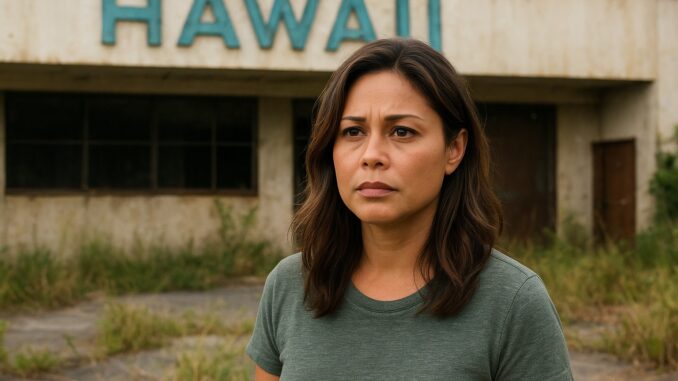
From Aloha to Abandonment
When NCIS: Hawai’i premiered, it brought the vibrant energy of Honolulu straight to our screens — crystal-blue waters, palm-lined streets, and an action-packed team led by Vanessa Lachey. But just months after CBS abruptly canceled the fan-favorite show, a chilling image has surfaced: the once-bustling Honolulu studio now lies empty, overtaken by weeds and silence.
Recently, one of the show’s cast members revealed the heartbreaking state of the set, leaving fans both nostalgic and furious. So what really happened to NCIS: Hawai’i, and why did CBS pull the plug on one of its most diverse and beloved franchises?
The Abrupt End of a Beloved Show
NCIS: Hawai’i was more than just another procedural drama — it was a cultural milestone. As the first NCIS series led by a female Special Agent in Charge, the show quickly found its own rhythm and loyal audience.
However, in early 2024, CBS announced the show’s cancellation after just three seasons, citing “creative restructuring” and “budget adjustments.” Fans weren’t buying it — and now, with the studio’s shocking state, the decision feels even more questionable.
The Revealing Interview: “It’s Like a Ghost Town”
A former NCIS: Hawai’i cast member recently broke their silence in an interview that sent waves through the fandom.
“I drove by our old studio last month,” they said. “It’s completely empty. You can see the weeds growing through the cracks in the pavement. It’s like no one’s been there in months — it’s heartbreaking.”
Their words paint a vivid picture of neglect. What was once a creative hub filled with energy and purpose now resembles an abandoned relic — a symbol of how quickly Hollywood can move on.
Behind the Scenes: How CBS Made the Call
Insiders claim CBS executives struggled to balance costs between NCIS: Hawai’i and other upcoming productions. Despite solid ratings, the network reportedly prioritized projects with higher syndication potential.
Industry analysts speculate that shooting in Hawaii — though visually stunning — came with steep production costs. Between location fees, logistics, and transportation, maintaining the island set became a financial challenge.
Still, for many fans, the numbers don’t justify the emotional loss.
Why Fans Feel Betrayed
The backlash was immediate. Viewers took to social media platforms like X (formerly Twitter) and Instagram to express outrage.
Many argued that NCIS: Hawai’i was canceled just as it was hitting its stride. The show had built a strong character ensemble, explored compelling Hawaiian culture, and earned critical praise for its representation of women and local talent.
“They canceled the only NCIS that felt fresh,” one fan wrote. “And now the studio’s just rotting away? That’s unforgivable.”
A Symbolic Loss for Hawaii’s Film Industry
The empty NCIS: Hawai’i studio isn’t just a loss for fans — it’s a blow to Hawaii’s local entertainment economy.
For years, the series provided steady jobs to hundreds of crew members, extras, and local vendors. With production now gone, many island professionals have been left searching for work.
Hawaii’s film industry officials have called on major networks to reinvest in the state’s creative workforce, warning that the closure of such a major production hub could have long-term economic consequences.
The Emotional Impact on the Cast
Former cast members have spoken candidly about their disappointment. Vanessa Lachey, who portrayed Special Agent Jane Tennant, shared an emotional message on Instagram following the cancellation:
“We built something special here. Hawaii became our home, and the people our family. This goodbye hurts.”
The recent revelation about the abandoned studio adds another layer of sadness to the farewell — a stark reminder of how temporary even the brightest moments in television can be.
The Power of Location: Why Honolulu Mattered
Part of what made NCIS: Hawai’i so captivating was its use of real Hawaiian landscapes. From Pearl Harbor to the North Shore, the series highlighted the island’s stunning beauty while weaving local culture into its plots.
Filming in Honolulu gave authenticity to the show’s narrative — it wasn’t just another procedural set in a nondescript city. The location was a character itself. And now, seeing those same sets overrun with weeds feels almost poetic — paradise lost.
Could NCIS: Hawai’i Be Revived?
Hope dies hard for TV fans. Rumors have circulated that streaming platforms or rival networks might pick up the series.
While no official discussions have been confirmed, industry insiders suggest that NCIS: Hawai’i’s passionate fanbase and unique appeal make it a potential candidate for revival — perhaps as a limited series or spin-off.
Until then, fans continue to campaign online under the hashtag #SaveNCISHawaii, refusing to let their island team fade into obscurity.
Lessons from the Cancellation
The downfall of NCIS: Hawai’i reveals an uncomfortable truth about modern television: even strong shows aren’t safe from corporate calculus.
Networks today prioritize profitability over passion, often canceling beloved series in favor of riskier but more profitable ventures. The abandoned studio stands as a haunting symbol of this new reality — where storytelling gives way to spreadsheets.
The Legacy That Lives On
Despite its untimely end, NCIS: Hawai’i leaves behind an undeniable legacy. It pushed boundaries for representation, celebrated Hawaiian culture, and introduced one of the most compelling female leads in NCIS history.
The show may be gone, but its spirit continues to inspire fans — many of whom still rewatch episodes as a tribute to what once was.
The Empty Studio: A Metaphor for Lost Potential
It’s hard not to view the overgrown Honolulu studio as more than just a location — it’s a metaphor for Hollywood’s fleeting nature. What once bloomed with creativity now withers, abandoned by the same system that built it.
Yet, in that decay lies something strangely poetic: the reminder that stories, though temporary, leave marks that don’t fade easily.
Why This Still Matters
Beyond nostalgia, NCIS: Hawai’i’s demise raises bigger questions about diversity, representation, and support for location-based productions. The series gave voices to new talents and communities — and its loss highlights the fragility of progress in entertainment.
It’s not just about a show being canceled. It’s about what that decision says about the priorities of modern television.

Fan Efforts to Keep the Spirit Alive
The NCIS: Hawai’i fandom remains one of the most passionate in the NCIS universe. Fan pages, online petitions, and tribute videos continue to circulate, celebrating the show’s legacy and demanding justice.
Their dedication proves one thing — even if the set stands empty, the spirit of NCIS: Hawai’i still thrives in the hearts of those who loved it.
Conclusion: Aloha, But Never Goodbye
The image of NCIS: Hawai’i’s deserted studio is more than just a sad visual — it’s a statement. It’s about lost opportunities, corporate decisions, and the bittersweet beauty of television memories.
While the weeds may grow and the lights stay off, the show’s impact endures. Because NCIS: Hawai’i wasn’t just about solving crimes — it was about family, resilience, and the magic of paradise.
FAQs
1. Why was NCIS: Hawai’i canceled despite good ratings?
CBS cited creative restructuring and budget issues, though many fans believe internal politics and high production costs played a role.
2. Is there any chance of NCIS: Hawai’i being revived?
While nothing is confirmed, fan campaigns and streaming interest could spark discussions about a revival or limited spin-off.
3. What happened to the NCIS: Hawai’i set?
According to a former cast member, the Honolulu studio is now abandoned, with weeds overtaking the once-busy location.
4. How did the cast react to the cancellation?
Stars like Vanessa Lachey expressed deep sadness, calling the show and Hawaii a second home that changed their lives.
5. Why do fans care so much about the show’s ending?
Because NCIS: Hawai’i represented progress — strong female leadership, cultural representation, and authentic storytelling — all of which deserve to live on.